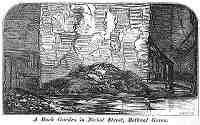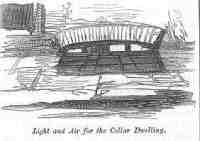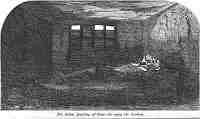More Revelations of Bethnal Green
Excerpt from an article in "The Builder", vol. XXI, no. 1082 (31st October 1863).
Notwithstanding
all that has been said on the subject elsewhere as well
as in our own pages, the horrible condition in which a
vast population are living is not yet understood and
realized by the public. Nothing short of a personal
examination, indeed, under proper guidance, can convey a
complete idea of it. We must endeavour, however, by
bringing the pencil to the aid of the pen, to make the
facts a little clearer, and to urge on the authorities
the absolute necessity for immediate steps with a view to
bringing about a better state of things. Some of these
steps, moreover, are quite practicable and not
difficult...
 We
have recently again carefully examined a considerable
part of the district [of Bethnal Green],
including Grey Eagle-street, and the courts at the back
of it, Phoenix-street, Nichol-street and its courts, Old
Nichol-street, Half Nichol-street, and others. With few
exceptions, each room contains a separate family; some
consisting of mother, father, and eight children. The
first two adjoining houses that we looked into, of six
rooms each, contained forty-eight persons. To supply
these with water, a stream runs for ten or twelve minutes
each day, except Sunday, from a small tap at the back of
one of the houses. The struggle for it is sometimes
great: the means of storage are very small. The result
is, as in other places mentioned by us again and again,
that on Sunday there is seldom a drop of water to be
found, and this of itself leads to a whole train of
evils. The houses are, of course, ill-ventilated. The
front room in the basement, wholly below the ground, dark
and damp, is occupied, at a cost of 2s. a week for rent.
We tried our old test on the first two women seen
standing at the doors. "How many children have
you?" "Four," was the reply of the first
of them. "Have you lost any?" "Five, and
there is one inside given over by the doctor." The
second had two living and had lost three. Many of the
houses are in a dangerous state structurally, and some
have been condemned under the Building Act. Here is the
description the inspector of nuisances gave of these when
he went to the magistrate at Worship-street on the
subject. He said each room contained a man and his wife
and six or seven children. The whole were filthy and
dilapidated; the party-wall between Nos.20 and 21 bulged
at the basement to the extent of at least 2 feet, and the
whole brickwork throughout was so much fractured that it
might fall at any moment. In the basement of No.20 a
great quantity of the dust and house refuse had not been
removed for fourteen years, and formed a mound, through
which a pathway had been made, by constant treading,
which led from and to the entrances at the back and
front. The water for drinking perposes was derived from a
small tub without a lid in the midst of this heap, but a
very scanty supply was furnished, it not being on much
more than twenty minutes at a time. There was no
efficient drainage to take off the waste water, so that
the basements were saturated by it, and pools of stagnant
water collected in the yards, which were unpaved, and
contained a quantity of putrid vegetables, that had not
been removed for a long time!
We
have recently again carefully examined a considerable
part of the district [of Bethnal Green],
including Grey Eagle-street, and the courts at the back
of it, Phoenix-street, Nichol-street and its courts, Old
Nichol-street, Half Nichol-street, and others. With few
exceptions, each room contains a separate family; some
consisting of mother, father, and eight children. The
first two adjoining houses that we looked into, of six
rooms each, contained forty-eight persons. To supply
these with water, a stream runs for ten or twelve minutes
each day, except Sunday, from a small tap at the back of
one of the houses. The struggle for it is sometimes
great: the means of storage are very small. The result
is, as in other places mentioned by us again and again,
that on Sunday there is seldom a drop of water to be
found, and this of itself leads to a whole train of
evils. The houses are, of course, ill-ventilated. The
front room in the basement, wholly below the ground, dark
and damp, is occupied, at a cost of 2s. a week for rent.
We tried our old test on the first two women seen
standing at the doors. "How many children have
you?" "Four," was the reply of the first
of them. "Have you lost any?" "Five, and
there is one inside given over by the doctor." The
second had two living and had lost three. Many of the
houses are in a dangerous state structurally, and some
have been condemned under the Building Act. Here is the
description the inspector of nuisances gave of these when
he went to the magistrate at Worship-street on the
subject. He said each room contained a man and his wife
and six or seven children. The whole were filthy and
dilapidated; the party-wall between Nos.20 and 21 bulged
at the basement to the extent of at least 2 feet, and the
whole brickwork throughout was so much fractured that it
might fall at any moment. In the basement of No.20 a
great quantity of the dust and house refuse had not been
removed for fourteen years, and formed a mound, through
which a pathway had been made, by constant treading,
which led from and to the entrances at the back and
front. The water for drinking perposes was derived from a
small tub without a lid in the midst of this heap, but a
very scanty supply was furnished, it not being on much
more than twenty minutes at a time. There was no
efficient drainage to take off the waste water, so that
the basements were saturated by it, and pools of stagnant
water collected in the yards, which were unpaved, and
contained a quantity of putrid vegetables, that had not
been removed for a long time!
In George's-street three children have died in one
house, and the rest of the family have been made ill,
through the badness of the drainage and the want of pure
air.
 The occupation of
the underground rooms here, as well as elsewhere, is
illegal, and may at once be prevented. Under the Local
Management Act, as our readers may remember, an
underground room may not be occupied separately as a
dwelling unless certain conditions are complied with, one
of which is that there shall be a window of specified
size, with an area before it open down to 6 inches below
the floor of the room. The terms of the Act, however,
have led to the belief that the duty of discovering the
occupancy of such rooms rests with the district surveyor
appointed under the Building Act, whose duties are
entirely structural, who is quite unfit to serve as
sanitary policeman, and moreover has not power under the
Act to prove his case if he were to try. For the most
part, therefore the Act is nugatory, - we had nearly
written, with Hood, Newgatory, - excepting
where, as in Islington and some other parishes, the
inspector of nuisances or other qualified person obtains
the proof of occupancy, calls on the district surveyor
for a report as to the structural deficiency only, and
carries the case before a magistrate in accordance with
the Act.
The occupation of
the underground rooms here, as well as elsewhere, is
illegal, and may at once be prevented. Under the Local
Management Act, as our readers may remember, an
underground room may not be occupied separately as a
dwelling unless certain conditions are complied with, one
of which is that there shall be a window of specified
size, with an area before it open down to 6 inches below
the floor of the room. The terms of the Act, however,
have led to the belief that the duty of discovering the
occupancy of such rooms rests with the district surveyor
appointed under the Building Act, whose duties are
entirely structural, who is quite unfit to serve as
sanitary policeman, and moreover has not power under the
Act to prove his case if he were to try. For the most
part, therefore the Act is nugatory, - we had nearly
written, with Hood, Newgatory, - excepting
where, as in Islington and some other parishes, the
inspector of nuisances or other qualified person obtains
the proof of occupancy, calls on the district surveyor
for a report as to the structural deficiency only, and
carries the case before a magistrate in accordance with
the Act.
This should at once be done in Bethnal-green, and
scores of murderous dens would be shut up. It is no
answer to say the inhabitants prefer to live, or (more
truly) to die, in such rooms rather than meet the
difficulty of finding a better room elsewhere. they must
not be allowed to do so. Suicide is not permitted; still
less suicide that leads to the death of others not
desiring to die, and to the pauperising of a still larger
number, who must be maintained by the more sensible and
provident.
 One of the worst
examples that we saw of these underground rooms we must
endeavour to illustrate. It is in Nichol-street, No.59,
and may be described as entirely below the surface. the
window of the apartment is a little over 3 feet in width,
and about the same in height; the area is even with the
breadth and depth of the window. It extends from the wall
about 2 feet, and was closed with an iron grating; but
this having become broken, the entire top of the area has
been covered with wood, so that the only means of light
and ventilation is a chink 3 feet wide by 4 and a half
inches in height. Passing through the passage to the
back, the dilapidated condition of the premises, as may
be seen in the sketch, is startling. The plaster has
fallen from the walls and the ceilings, the narrow
staircase is rotten and shaky, the general colour is of a
dingy smoky black, with peeps of indifferent brickwork
and broken laths. At the back there is a large open
space, in a most filthy condition; damp refuse of all
kinds is piled up against the wall; there is no supply of
water; the people have "to hunt for it;" nor is
there any distinct closet accommodation for this home.
When looking at the wet and poisonous mound, at the
ill-built wall through which the damp and unwholesome
matter must weep, and seeing that in all directions
similar neglect of proper scavenging is evident, we
cannot but insist that it is disgraceful to the parish.
But as regards the cellar, in all our experince of London
destitution and awful conditions, we have seen nothing so
harrowing as what there met the view. Through the narrow
space of the window that is left open ther came a
glimmering light, which fell upon two figures, on a
broken truckle, seemingly naked, with the exception of
some black rags which passed across the middle of their
bodies; but the greter part of the room, small as it is,
was in total darkness. Mr. Price that there were more
figures visible; and on asking if any were there, a
female voice replied, "Yes; here are two of us.
Mother is out;" and gradually, as the eye became
accustomed to the gloom two other figures were to be seen
lying in a corner upon rags. This was between twelve and
one o'clock in the day. we were not disposed to look
further into their mystery; but it was evident that one
of the unfortunates was resting close to the damp and
poisonous wall. Neither words nor drawing can convey a
complete idea of this den and its dense and polluted
atmosphere. Instead of this place being filled with the
pure life-giving air which is needful for human
existence, it seemed occupied by something tangible which
might be moved and weighed. The height of the room, all
of which is below the surface, is not quite 6 feet. The
window would not open; the ceiling was ready to fall; and
the walls, so far as the light showed, were damp and
mildewed. The inmates here were a widow and her four
children: one a girl twenty years of age, another girl
eighteen, a boy of fourteen, and a boy of twelve. What,
we ask, is to become of those unhappy creatures, reared
in the dark and the dirt, and of the multitude who in
this metropolis are "dragged up" under similar
circumstances?
One of the worst
examples that we saw of these underground rooms we must
endeavour to illustrate. It is in Nichol-street, No.59,
and may be described as entirely below the surface. the
window of the apartment is a little over 3 feet in width,
and about the same in height; the area is even with the
breadth and depth of the window. It extends from the wall
about 2 feet, and was closed with an iron grating; but
this having become broken, the entire top of the area has
been covered with wood, so that the only means of light
and ventilation is a chink 3 feet wide by 4 and a half
inches in height. Passing through the passage to the
back, the dilapidated condition of the premises, as may
be seen in the sketch, is startling. The plaster has
fallen from the walls and the ceilings, the narrow
staircase is rotten and shaky, the general colour is of a
dingy smoky black, with peeps of indifferent brickwork
and broken laths. At the back there is a large open
space, in a most filthy condition; damp refuse of all
kinds is piled up against the wall; there is no supply of
water; the people have "to hunt for it;" nor is
there any distinct closet accommodation for this home.
When looking at the wet and poisonous mound, at the
ill-built wall through which the damp and unwholesome
matter must weep, and seeing that in all directions
similar neglect of proper scavenging is evident, we
cannot but insist that it is disgraceful to the parish.
But as regards the cellar, in all our experince of London
destitution and awful conditions, we have seen nothing so
harrowing as what there met the view. Through the narrow
space of the window that is left open ther came a
glimmering light, which fell upon two figures, on a
broken truckle, seemingly naked, with the exception of
some black rags which passed across the middle of their
bodies; but the greter part of the room, small as it is,
was in total darkness. Mr. Price that there were more
figures visible; and on asking if any were there, a
female voice replied, "Yes; here are two of us.
Mother is out;" and gradually, as the eye became
accustomed to the gloom two other figures were to be seen
lying in a corner upon rags. This was between twelve and
one o'clock in the day. we were not disposed to look
further into their mystery; but it was evident that one
of the unfortunates was resting close to the damp and
poisonous wall. Neither words nor drawing can convey a
complete idea of this den and its dense and polluted
atmosphere. Instead of this place being filled with the
pure life-giving air which is needful for human
existence, it seemed occupied by something tangible which
might be moved and weighed. The height of the room, all
of which is below the surface, is not quite 6 feet. The
window would not open; the ceiling was ready to fall; and
the walls, so far as the light showed, were damp and
mildewed. The inmates here were a widow and her four
children: one a girl twenty years of age, another girl
eighteen, a boy of fourteen, and a boy of twelve. What,
we ask, is to become of those unhappy creatures, reared
in the dark and the dirt, and of the multitude who in
this metropolis are "dragged up" under similar
circumstances?
For four such rooms as we have attempted to describe,
there are paid on the whole 12s. a week; that is, 31l.
4s. per year. Another similar cellar, not quite so dark
or so damp, we found occupied by a man and his wife and
six children, aged respectively fourteen, eleven, nine,
six, and four years, and one ten months. We could draw a
frightful picture of what met our sight in an upper room
of a neighbouring house, but it would not further our
present object, which is practical and precise, - to call
for a sufficient water supply; the periodical removal, at
short intervals, of all refuse; and the enforcement of
the law in respect of the occupancy of underground
dwellings.
We returned from the inspection saddened and ill. We
have written of it coolly, but it was a sight to move
indignation.
Reprinted with permission of David Rich, Tower Hamlets History On Line.